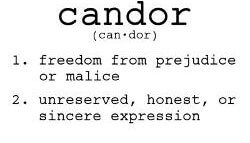The Good News: Lack of Candor is Better than Falsification, So Use It!
By Ann Boehm, June 21, 2022
 In a misconduct case involving an employee providing false information, don’t charge “falsification” even if it’s for improperly filed time cards. I know — it isn’t logical but trust me on this one. In the office, you can call it “falsification of time cards,” but don’t use that terminology if you discipline the employee, and I wouldn’t even use it in an email. Use the kinder and gentler charge that we use in government speak – “lack of candor.” Don’t believe me? A recent MSPB case makes this crystal clear.
In a misconduct case involving an employee providing false information, don’t charge “falsification” even if it’s for improperly filed time cards. I know — it isn’t logical but trust me on this one. In the office, you can call it “falsification of time cards,” but don’t use that terminology if you discipline the employee, and I wouldn’t even use it in an email. Use the kinder and gentler charge that we use in government speak – “lack of candor.” Don’t believe me? A recent MSPB case makes this crystal clear.
In Sheiman v. Department of the Treasury, SF-0752-15-0372-I-2 (May 24, 2022)(NP), a GS-13 senior appraiser for the Internal Revenue Service seemed to think he was entitled to play golf during work hours, and while on sick leave too. An investigation revealed that “between August 2006 and August 2013 the appellant ‘golfed during official IRS duty hours on at least 205 days for which he claimed no annual leave on his official IRS timesheets.’” Id., slip op. at 2.
Out of those 205 days, he claimed sick leave on 30 days, was on official travel for 5 days, and either he or his vehicle were observed at various Hawaii golf courses during official duty hours on 4 days.” Id.
You gotta feel for the guy. He lived in Hawaii. Golf was calling him. Ok, maybe not. Fire him!
The agency removed him based upon two charges: “168 specifications of providing false information regarding his official time and attendance records, and 29 specifications of providing misleading information regarding his official time and attendance records.” Id. He appealed his removal to the MSPB, and the administrative judge found the agency failed to prove the “providing false information” charge because it “failed to demonstrate that the [employee] had the intent to defraud or deceive necessary to prove a falsification charge.” Id., slip op. at 3 (emphasis added).
Aargghhh. We at FELTG warn agencies about such things. Properly charging misconduct in the Federal government is something of an art. There are two universal truths to charging: An agency must prove every word of a charge by a preponderance of the evidence; and when using certain labeled charges, the agency not only has to prove every word of the charge, but also the elements of the charge by a preponderance of the evidence.
“Falsification” (which includes “lying” and “misrepresentation”) is a labeled charge. It requires proof that the employee supplied incorrect information, provided with the intent to mislead, for private material gain. Boo v. DHS, 2014 MSPB 86.
It is very hard to prove intent. Agencies frequently lose cases because they use a labeled charge that they cannot prove. There’s not a good reason to use a labeled charge, like falsification. The rest of the Sheiman case explains why.
You see, the MSPB AJ did sustain the second charge—the “providing misleading information” charge that the AJ “interpreted as akin to a lack of candor, thus requiring a lesser showing of intent than falsification.” Sheiman, SF-0752-15-0372-I-2, slip op. at 4 (emphasis added). You get that? The agency won on the “lack of candor” charge.
Sadly, this case resulted in long drawn-out litigation. The AJ mitigated the removal to a 30-day suspension. When you fail to prove a charge, the MSPB can reweigh the penalty factors. When the AJ did that, he decided removal was not reasonable.
The agency appealed to the MSPB and waited years for a quorum. The MSPB agreed with the AJ’s findings on the charges – the agency failed to prove the “falsification” charge but proved the “lack of candor” charge. However, the MSPB disagreed with the AJ’s determination on penalty and reinstated the removal. Fortunately for the agency, the deciding official “stated in his decision letter that removal was an appropriate penalty for each charge independently.” Id., slip op. at 12. Hooray for the deciding official!! According to the MSPB, “the administrative judge erred in revisiting his penalty assessment on the basis that the agency only proved one of its two charges.” Id.
Phew! The right decision emerged from this mess. But the agency never should have put itself in this disastrous place.
Learn from this case. Don’t charge “falsification.” There’s simply no need to do so when “lack of candor” works just as well (removal was justified under that charge!!), and it’s easier to prove. Easier is better! And that’s Good News. Boehm@FELTG.com
